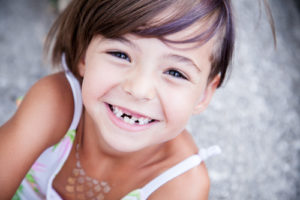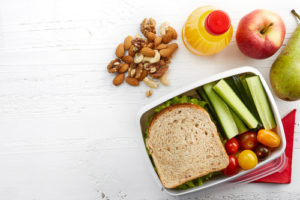Making Good Choices for Your Child’s Teeth

At Designer Smiles, we offer dental care for the whole family and our patients who are parents regularly ask us questions like, “What kind of snacks can I give my kids that are okay for their teeth?” There are many things parents can do at home to help their children maintain healthy teeth.
The two most important ways parents affect their child’s dental health are 1) guiding their healthy food and drink choices, and 2) teaching good oral hygiene.
This blog outlines how to choose the best foods and drinks for your child.
Making Good Drink Choices
Drinks cause more cavities than food in young children. Kids often carry around sippy cups or bottles filled with something besides water. This is the worst thing you can do for your child’s teeth!
Following these guidelines for drinks keeps your children’s cavity risk as low as possible.
- A bottle or sippy cup should never contain anything except water. Even milk contains sugar and causes cavities if it stays in contact with the teeth long enough. Allowing your child to sip on a sugary drink throughout the day or overnight greatly increases cavity risk. Limit these sipping beverages to water only. This greatly reduces cavity risk.
- Small children should never drink sodas. The sugar content and acidic pH make sodas the very worst beverage for young teeth. The enamel of baby teeth is thinner than that of permanent teeth. This thin enamel makes it easier for cavities to spread once they have begun.
- Only give your child fruit juice, sports drinks, or milk with a meal. The increased saliva stimulated by chewing food counteracts the negative effects of the sugar in these drinks.
- If your child does have something sugary to drink between meals, give him a piece of sugar-free gum to chew Ice Cubes brand chewing gum is our favorite. It contains 2g of xylitol per piece. Xylitol kills bad bacteria in your mouth and lowers cavity risk. The chewing action also stimulates more saliva production, which fights cavity-causing bacteria.
Making Good Food Choices

In order to choose good food for your child, you need to understand the difference between simple and complex carbohydrates. Fats and proteins do not cause cavities. The bad bacteria in the mouth only digest carbs to produce cavities.
Simple carbohydrates are short chain sugars that bacteria break down very quickly. Simple carbs make it easy for bacteria to cause cavities.
Simple carbs include sodas, candies, baked sweets, and anything containing sugar or corn syrup as a main ingredient.
Complex carbohydrates are long chains of sugars that take much longer to break down. Bacteria can digest complex carbs, but it takes much longer. Typically, complex carbs only cause cavities when they are stuck on or in the teeth for an extended period of time.
Complex carbs include foods like green vegetables, whole grains, starches such as potatoes, and beans or peas. The risk with complex carbohydrates is their sticky texture increases the likelihood of their being stuck on or in between the teeth. Complex carbs will also cause cavities when not properly cleaned from the tooth surface.
The following guidelines help reduce your child’s cavity risk from food.
- Limit cakes, cookies, other sweets and dried fruit to mealtime only. These treats should be enjoyed as dessert with a meal. Because they contain simple carbohydrates, they are more likely to cause cavities. Keeping them with a meal helps you fight those cavities with your saliva.
- Choose fats or proteins for snacking between meals. Nuts and cheese are wonderful snack options for little teeth.
- If you do not have fats or proteins available, look for complex carbohydrate snacks. Raw veggies are the second best option for between meal snacking, after cheese and nuts.
- Avoid any candy that is sticky. Candies like Starburst or caramels get stuck down in the grooves and pits of the teeth. These deep areas are difficult to clean, so cavities are likely.
- Avoid hard candies like peppermints or lollipops. Children usually suck on these hard candies for an extended period of time, which provides a constant supply of sugar to the bad bacteria in the mouth.
Teaching Good Oral Hygiene
The second important factor in cavity risk in young children is their oral hygiene. In a child’s learning of good habits, there is always a progression.
- First, the parent performs the tasks for him.
- Then, you supervise and help him.
- Finally, at a certain point, he can be trusted to do the tasks independently.
In oral hygiene, this progression is very slow. Children should not be released to brush and floss their teeth by themselves until they can write their names in cursive!
In stage one, you brush and floss the teeth for your child. Start early! Teeth need to be cleaned as soon as they appear in the mouth. For most babies, this occurs at 6 months old. The earlier you start, the easier it is for your child to accept and cooperate. They come to expect it as a daily ritual.
Easy Brushing and Flossing Technique:
 Sit on the floor cross-legged.
Sit on the floor cross-legged.- Have your child lay down with his head in your lap and look up at you.
- You should be able to look down into the child’s mouth and see every tooth.
- Using only a pea-sized amount of toothpaste and NO water, gently brush all exposed surfaces of the child’s teeth.
- Keep the child in this position for flossing. Floss every tooth that touches its neighbor. (Sometimes baby teeth have small gaps between them. Teeth that are spaced out do not require flossing.)
When you reach the supervision phase, add plaque disclosing rinse or tablets to the routine. These stain bacteria a bright color so you see the areas your child is missing when he brushes by himself. Then you are able to guide him and help reach those areas with the toothbrush and floss.
Set a Good Example
Your kids need to see you brushing and flossing your teeth regularly. It is a wonderful idea to do this together after breakfast and before bedtime. If you do not prioritize your own oral hygiene, your children will not prioritize theirs.
Need Help Teaching Your Child Good Habits?
Call 281-667-4010 today to schedule an appointment with Phyllis and Nancy, our amazing dental hygienists. They have lots of tricks up their sleeves to help you clean your child’s teeth.
